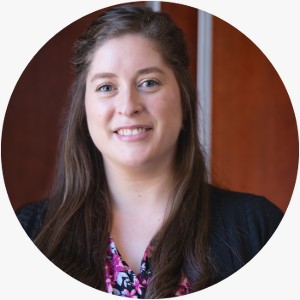Lillian Rodriguez Steen, PhD
Education
- Ph.D. in Forensic Psychology, Ontario Tech University
- B.A. in Psychology, University of Toledo
Courses Taught at ACPHS
- Forensic Psychology
- Advanced Forensic Psychology
- Forensic Mental Health Law
- Child & Adolescent Forensic Psychology
- Forensic Psychology Senior Seminar
Selected Publications
- Rodriguez Steen LA & Malloy LC (2023). Encouraging children’s clarification requests with “I Don’t Understand” rule reminders. Applied Cognitive Psychology.
- Malloy LC, Dykstra VW, Rodriguez Steen LA, Filoso D, Salem H, Comer JS, Peris TS, Pincus DB, Ehrenreich-May J, & Evans AD (2023). Avoidance parent-child communication about COVID-19: A longitudinal investigation of associations with youth adjustment across the first 6 months of the pandemic. Research on Child and Adolescent Psychopathology.
- Lawson M, Rodriguez Steen LA, London K, & Coleman, E (2023). The effect of parental bias on the reliability of children’s event reports and children’s memory for suggestive parental questioning. Journal of Applied Research in Memory and Cognition.
- Rodriguez Steen LA & Malloy LC (2023). Youth decision-making and juvenile justice policy. Routledge Handbook of Evidence-Based Criminal Justice Practices.
- Lawson M, Rodriguez Steen LA, & London K (2018). A systematic review of the reliability of children’s event reports after discussing experiences with a naïve, knowledgeable, or misled parent. Developmental Review.
Awards
- Society for Research in Child Development Early Career Travel Award
- American Psychology-Law Travel Award
Presentations
- Rodriguez Steen LA, Edwards DF, & Malloy LC (2024). Effect of practice questions and age on children’s ground rule applications. Eastern Psychological Association, Philadelphia, PA.
- Rodriguez Steen LA & Malloy LC (2024). “Where was it?” Children’s responses to tricky interview questions. American Psychology-Law Society, Los Angeles, CA.
- Espinosa Becerra AK, Rodriguez Steen LA, & Malloy LC (2024). Do opinions about immigrants predict adults’ perceptions of non-native language-speaking youth who testify via an interpreter? American Psychology-Law Society, Los Angeles, CA.
- Lawson M, Rodriguez Steen LA, London K, Holland T, Gorelik K, & Ferguson S (2024). Maternal questioning and children’s report accuracy for an event including touch. American Psychology-Law Society, Los Angeles, CA.
- Rodriguez Steen LA, Mandap P, Figueiredo Neves M, Mattes ET, McArthur CL, Spyksma SD, & Malloy LC (2023). Use of reminders to facilitate children’s clarification requests in interviews. Society for Research in Child Development, Salt Lake City, UT.
- Rodriguez Steen LA, Mattes ET, Spyksma SD, & Malloy LC (2023). “Were any of my questions silly?”: Children’s recognition of unanswerable questions. Society for Research in Child Development, Salt Lake City, UT.
- Rodriguez Steen LA, Mandap P, Figueiredo Neves M, Mattes ET, McArthur CL, Spyksma SD, & Malloy LC (2023). Effect of “I don’t understand” rule reminders, age, and question characteristics on children’s clarification requests. American Psychology-Law Society, Philadelphia, PA.
- Rodriguez Steen LA, McArthur CL, Mandap P, & Malloy LC (2023). “What’s my dog’s name?”: Effect of ground rule interview practice on children’s ground rule application. American Psychology-Law Society, Philadelphia, PA.
- Espinosa Becerra AK, Malloy LC, & Rodriguez Steen LA (2023). How do interpreter-mediated interviews affect mock jurors’ perceptions of young witnesses? American Psychology-Law Society, Philadelphia, PA.
- Espinosa Becerra AK, Malloy LC, & Rodriguez Steen LA (2022). Mock jurors’ perceptions of children testifying via a language interpreter. International Investigative Interviewing Research Group, Winchester, UK.
Professional Organization Memberships
- Eastern Psychological Association
- Society for Research in Child Development
- American Psychology-Law Society


